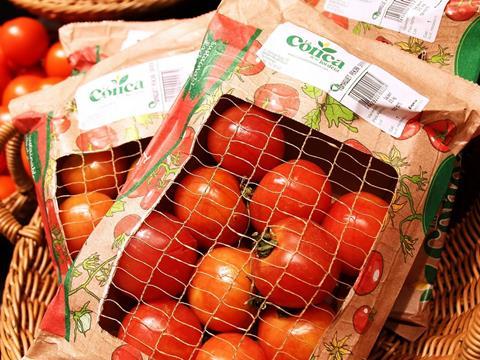
Spanish and Andorran retailer Caprabo has packaged its tomatoes in what claims to be 100% recyclable and compostable packaging made of paper, paper mesh, and bamboo – a transition expected to save 3 tons of plastic a year.
To achieve this reduction, the initiative expects that around 205 thousand kilograms of tomatoes will be sold without plastic packaging annually.
“Caprabo hopes to advance initiatives that contribute to minimising the impact of plastics on the environment, and we, as a supermarket, can do it with actions that allow us to take extreme care of the environment,” explains Fernando Tercero, manager of Proximity Products at Caprabo. “From our point of view, the initiative, which comes from one of our local suppliers, is important because it shows the extraordinary work that small producers do to adapt to concerns linked to the care of the natural environment.”
Caprabo sells products sourced from local production processes, with its Proximity Programme for Regions giving approximately 300 small producers and agricultural cooperatives and over 2,800 of their products access to its stores.
Josep Ferrer, director of tomato supplier Conca de la Tordera, continues: “Caprabo is the first company with which we have worked with packaging that is strictly respectful of the environment. Its commitment as a responsible supermarket helps us meet one of our highest goals, which is the maintenance of our environment.
“In the Basin, we have an intrinsic vocation as a farmers’ cooperative and we ourselves are the ones who take care of the rural environment. Avoiding plastic helps us take care of the countryside, which is our way of life.”
Early last month, Dutch retailers Albert Heijn, ALDI, JUMBO, Lidl, and PLUS pledged to roll out reusable bags for their fruit and vegetable products. Consumers will be able to take this packaging home to be cleaned, and the companies anticipate that 126 million plastic bags and 10 million paper bags will be saved every year thanks to the new system.
Copa-Cogeca, Freshfel Europe, and Europatat have also released a statement criticising the Regulation on Packaging and Packaging Waste for its ban on packaging for fruit and vegetables under 1.5kg – instead calling for incentives and strategies such as the improvement of sorting, collection, and recycling management as well as the adoption of recycled, degradable, and compostable packaging.
However, Abel & Cole previously responded to research suggesting that compostable plastics will not decompose outside of specific conditions by removing compostable packaging from its customisable Fruit & Veg Boxes range.














No comments yet